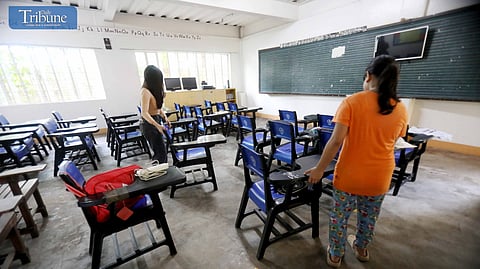
- NEWS
- the EDIT
- COMMENTARY
- BUSINESS
- LIFE
- SHOW
- ACTION
- GLOBAL GOALS
- SNAPS
- DYARYO TIRADA
- MORE

In a bid to help Filipino students cope, a toolkit for the mental health was launched recently in partnership with the Department of Health (DOH), Department of Education (DepEd), and Commission on Higher Education (CHED).
Recognizing the growing concern for the mental health and wellbeing of Filipino youth, Unilab Foundation partnered with government stakeholders and national organizations of mental health professionals to design and roll out the Heads Up PH program in schools and colleges nationwide.
Heads Up PH is the mental health and well-being pillar of Unilab Foundation that aims to improve the mental health and well-being of young Filipinos through holistic mental health programs anchored on the Mental Health and Psychosocial Support (MHPSS) Framework and the Multi-Tiered System of Supports (MTSS).
A data by DepEd revealed that there were 404 recorded cases of completed suicide among public school students, along with 2,147 recorded cases of attempted suicide during the academic year 2021-2022.
In 2013, over than 574,000 or 3 percent of Filipino youth attempted to end their lives.
By 2021, the percentage rose to 7.5 percent, equivalent to almost 1.5 million youth with such experiences.
According to the World Health Organization, suicide is the third leading cause of death among 15 to 29 year olds across the globe.
Gaps in the system
According to Dr. Sheila Marie G. Hocson, former president of the Philippine Guidance and Counseling Association and currently the principal resource person for Heads Up PH, several factors contribute to the rise in mental health concerns among students.
Among them are the challenges brought by the Covid-19 pandemic, poverty, bullying, internet addiction, family and academic concerns, climate change leading to uncomfortable heat in classrooms and flooding conditions in communities, a lack of mental health literacy, and insufficient interventions and resources.
“In the Philippine public school system, there is only one guidance counselor serving 25,000 students,” Hocson said.
“There are also not enough psychologists, psychiatrists and developmental pediatricians who can provide help. What’s more, accessing private mental health services can be expensive,” she added.
According to the Philippine Mental Health Association, Inc., there is less than one mental health worker for every 100,000 Filipinos.
Stigma surrounding mental health issues
The stigma surrounding mental health conditions is also still prevalent, and acts as a barrier to help-seeking behavior, Hocson furthered.
Studies have shown that students with suicidal ideations prefer talking with their peers about their mental health challenges instead of approaching their parents, guardians, or other relatives.
Results from the 2021 Young Adult Fertility and Sexuality Study of the University of the Philippines Population Institute revealed that six in 10, or 62 percent, of those who ever thought of committing suicide did not reach out to anyone about it.
Further, only two percent of youth who experienced suicide attempts reached out to a professional.
“Cases of mental health conditions are not diagnosed and that has hindered access to mental health programs among the youth,” Hocson explained.
Empowering early responders
Heads Up PH seeks to empower teachers and other school stakeholders to recognize signs of mental health challenges among students through the Race Against Suicide Toolkit.
It is designed to be a gatekeeper for Suicide Prevention in Schools, as a way to address the increasing cases of mental health concerns and suicidal tendencies.
The Toolkit, which has been piloted in several schools around the country, aims to fill the gaps created by the scarcity of mental health professionals, limitations on service delivery, increased reliance on remote support, and disruptions in the continuation of mental health services.
Marie Joan Urieta, Program and Strategic Support Director of Unilab Foundation, stated that the purpose of the toolkit is early detection, timely intervention, and a practical referral system that is implemented end to end.
“We aim to close the loop with a strategic approach, including access to medical health professionals. As soon as tendencies or risks are detected, appropriate interventions are in place,” Urieta said.
“Through this, we can also advance the conversation on mental health and well-being, working with other stakeholders toward our shared advocacy,” she added.
Heads Up PH, through Unilab Foundation, offers the gatekeeping program to guidance counselors, teachers, school administrators, nurses and other staff, training them in suicide prevention with tools to help thembe aware, assess, facilitate, and manage situations.
“Some people are not informed of the signs, symptoms, and tendencies for mental health concerns. There is the unavailability of assessment tools, such as a universal mental health screener. There is also a lack of mental health literacy and help-seeking behavior,” Hocson continued.
“Some people tend to be nervous and unprepared to handle cases of mental health tendencies. In some of the schools in the country, there are no accommodation policies, and a lack of awareness and access to mental health services. We seek to address these through Heads Up PH,” she added.
In addition to the RACE Against Suicide program, training on the use of a universal screener for public schools called Child and Adolescent Risk Screener (CARS) is being rolled out with DepEd.
The universal screening protocol is also a way to gather data on mental health among the youth, which can be a strong basis for priority setting and policies that are data-driven and evidence-based.
To date, the Heads Up PH RACE Toolkit has been piloted with more than 200 trainers and 5,084 trained gatekeepers across 17 regions, in collaboration with the Philippine Guidance and Counseling Association (PGCA), DepEd-National Educators Academy of the Philippines, and partner private schools.
Unilab Foundation has recently signed a Memorandum of Understanding with the Commission on Higher Education for a Training the Trainers Program on Suicide Prevention and Awareness in Higher Education Institutions.
